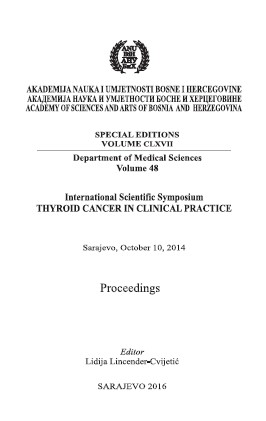SAVREMENI TERAPIJSKI ASPEKTI KOD RADIOJOD NEGATIVNIH PACIJENATA S KARCINOMOM ŠTITNJAČE
CURRENT THERAPEUTIC ASPECTS IN RADIOACTIVE IODINE-NEGATIVE THYROID CANCER PATIENTS
Author(s): Elma Kučukalić - Selimović, Amila Bašić
Subject(s): Health and medicine and law
Published by: Akademija Nauka i Umjetnosti Bosne i Hercegovine
Keywords: thyroid cancer; PET/CT imaging; Ga-68 DOTATOC; PRRT; targeted molecular therapy;
Summary/Abstract: Treatment of well-differentiated thyroid cancer includes total/near total thyroidectomy, treatment with radioactive iodine I-131 and lifelong thyroid hormone suppressive therapy. On the other hand, patients with radioactive iodine-negative cancers have limited therapeutic options. Before deciding on treatment, diagnostic procedures are performed which may affect therapy selection for certain patients. Tc-99m sestamibi is used in the diagnosis ofiodine-negative changes in thyroid cancers. 18-FDG PET imaging can help in determining the extent of disease and selecting a therapeutic method. Risk stratification in patients with radioactive iodine-negative thyroid cancer is also based on repeated determination of thyroglobulin levels, which reflects an occult tumor or metastases. Somatostatin receptor imaging using 68Ga-DOTA-TOC as a tracer for PET is also included in the diagnostic algorithm in patients with iodine-negative changes. 68Ga-DOTA-TOC-PET is of great diagnostic value in terms of determining the extent and localization of the disease, providing a much more accurate diagnosis in radioactive iodine-positive and radioactive iodine-negative thyroid cancer patients, as well as in mixed tumor types. This procedure also offers information for the possible use of peptide receptor radionuclide therapy (PRRT). Furthermore, in patients with a negative somatostatin receptor scan and with no PRRT indication, targeted molecular therapy with multikinase inhibitors or protease inhibitors may be considered (sunitinib, sorafenib, bortezomib and others). In conclusion, we can say that for patients with radioactive iodinenegative thyroid cancer, treatment methods should be adapted to the findings of prior targeted diagnostic procedures and, of course, the tumor type, disease stage and overall clinical condition of the patient.
Book: Međunarodni znanstveni simpozij "Tumori štitnjače u kliničkoj praksi"
- Page Range: 58-64
- Page Count: 7
- Publication Year: 2016
- Language: Bosnian, Croatian, Serbian
- Content File-PDF

